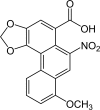Nephrotoxicity and Chinese Herbal Medicine
- PMID: 29615394
- PMCID: PMC6218812
- DOI: 10.2215/CJN.11571017
Nephrotoxicity and Chinese Herbal Medicine
Abstract
Chinese herbal medicine has been practiced for the prevention, treatment, and cure of diseases for thousands of years. Herbal medicine involves the use of natural compounds, which have relatively complex active ingredients with varying degrees of side effects. Some of these herbal medicines are known to cause nephrotoxicity, which can be overlooked by physicians and patients due to the belief that herbal medications are innocuous. Some of the nephrotoxic components from herbs are aristolochic acids and other plant alkaloids. In addition, anthraquinones, flavonoids, and glycosides from herbs also are known to cause kidney toxicity. The kidney manifestations of nephrotoxicity associated with herbal medicine include acute kidney injury, CKD, nephrolithiasis, rhabdomyolysis, Fanconi syndrome, and urothelial carcinoma. Several factors contribute to the nephrotoxicity of herbal medicines, including the intrinsic toxicity of herbs, incorrect processing or storage, adulteration, contamination by heavy metals, incorrect dosing, and interactions between herbal medicines and medications. The exact incidence of kidney injury due to nephrotoxic herbal medicine is not known. However, clinicians should consider herbal medicine use in patients with unexplained AKI or progressive CKD. In addition, exposure to herbal medicine containing aristolochic acid may increase risk for future uroepithelial cancers, and patients require appropriate postexposure screening.
Keywords: Acute Kidney Injury; Alkaloids; Anthraquinones; Aristolochic Acids; Chinese Herbal; Chronic; Drugs; Fanconi Syndrome; Flavonoids; Glycosides; Heavy; Herbal Medicine; Humans; Incidence; Medicinal; Metals; Neoplasms; Nephrolithiasis; Plants; Renal Insufficiency; Traditional Chinese Medicine; chronic kidney disease; kidney; nephrotoxicity; rhabdomyolysis.
Copyright © 2018 by the American Society of Nephrology.
Figures



References
-
- WHO: WHO Traditional Medicine Strategy 2014-2023, December 2013. Available at: http://www.who.int/medicines/publications/traditional/trm_strategy14_23/en/. Accessed March 15, 2017
-
- Fan T, Briggs J, Liu L, Lu A, Greef JVD, Xu A: The art and science of traditional medicine. Part 2: Multidisciplinary approaches for studying traditional medicine. Science 347: S27–S51, 2015
-
- Zhang Q, Zhu L, Lerberghe WV: The importance of traditional Chinese medicine services in health care provision in China. Univ Forum 2: 1–8, 2011
-
- Teng L, Zu Q, Li G, Yu T, Job KM, Yang X, Di L, Sherwin CM, Enioutina EY: Herbal medicines: Challenges in the modern world. Part 3: China and Japan. Expert Rev Clin Pharmacol 9: 1225–1233, 2016 - PubMed
Publication types
MeSH terms
Substances
LinkOut - more resources
Full Text Sources
Other Literature Sources
Medical

